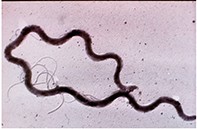Maternal and congenital syphilis – a problem that hasn’t gone away
Syphilis in pregnancy can be almost completely eliminated by universal early antepartum screening. The US Centers for Disease Control and Prevention (CDC), the Royal Australian and New Zealand College of Obstetricians and Gynaecologists and the American College of Obstetricians and Gynecologists recommend screening for syphilis early in every pregnancy. The co-existence of more than one sexually acquired infection is well recognised.
The existence of syphilis has been known for over 500 years. The incidence of the disease dropped after the discovery of penicillin in the 1940s but rose again in the early 1990s. In addition, there has been another steady rise in the incidence of syphilis in men and women in the USA and Europe between 2000 and 2007. Also, after 14 years of decline in the USA, the rate of congenital syphilis increased by 13% between 2006 and 2007.

